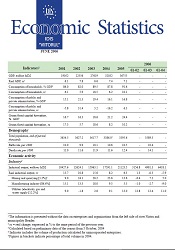

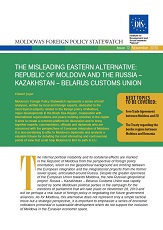
Keywords: customs-union; Russian international trade; Moldova Foreign Trade;
The internal political instability and its collateral effects are marked in the Republic of Moldova from the perspective of foreign policy orientation, which on the geopolitical background are orbiting between the European integration and the integrationist projects from the former soviet space, articulated around Russia. Despite the greater openness of the European Union towards Moldova, the new Russian geopolitical project: Russia – Kazakhstan – Belarus Customs Union was rapidly seized by some Moldovan political parties in the campaign for the elections of parliament that will take place on November 28, 2010 and will be perhaps a real issue of foreign policy in negotiating the future government alliances. As for Moldova, this alternative does not represent only a simple tactical move but a strategic perspective, it is important to emphasize a series of economic indicators primordial in sustainable development which do not support the inclusion of Moldova in the Eurasian economic space.
More...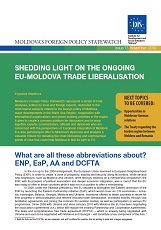
Keywords: EU-Moldova trade;
In the run up to the 2004 enlargement, the European Union launched a European Neighbourhood Policy (ENP), in order to create a “zone of prosperity, stability and security” along its borders. While several new neighbours, such as Moldova and Ukraine, were strongly insisting on a membership perspective, the ENP, with its prospect of political association and deeper economic integration, was a ‘carrot’ that the EU was ready to offer to these countries while it was not in a position to offer a membership.In 2009, under the Swedish presidency, the EU decided to strengthen the Eastern dimension of the ENP by launching the Eastern Partnership initiative (EaP), which would cover six CIS economies – Armenia, Azerbaijan, Belarus, Georgia, Moldova and Ukraine. Incentives offered to these countries in return for their progress in democratisation and reforms included trade liberalisation, increased mobility through visa facilitation agreements and joining the common EU aviation market, as well as participation in various EU programs. Since 2008 with Ukraine and since January 2010 with Moldova the EU has been negotiating the Association Agreements (AA), which will replace the existing Partnership and Cooperation Agreements. The deep and comprehensive free trade agreement (DCFTA) – which is already being negotiated with Ukraine and soon to be negotiated with Moldova and Georgia – will constitute a key component of the AAs.
More...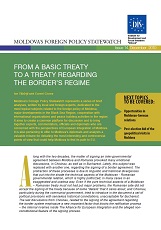
Keywords: Moldova-Romania relations;
Along with the two decades, the matter of signing an inter-governmental agreement between Moldova and Romania provoked many emotional discussions, in Chisinau as well as in Bucharest. Lately, this subject was replaced with another one, regarding the signing of a border agreement. The protraction of these processes is due to linguistic and historical divergences that put into the shade the technical aspects of the Moldovan – Romanian governmental relation, which is highly politicized, in many cases in an exaggerated and useless way. Even if the pure technical aspects of a Moldovan – Romanian treaty must not had put major problems, the Romanian side did not accept the signing of the treaty because of some “details” that it cares about, and Chisinau, particularly during the communist government, tried to introduce in the document a set of political provisions with senseless historical connotations, unacceptable for Bucharest.The last discussions from Chisinau, related to the signing of the agreement regarding the border system emphasize a new important factor that blocks the ratification process – the internal rivalries inside The Alliance for European Integration and the alleged non-constitutional feature of the signing process.
More...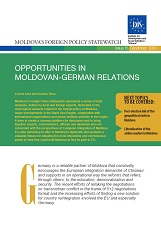
Keywords: Moldova-Germany realtions;
Germany is a reliable partner of Moldova that constantly encourages the European integration demarche of Chisinau and supports in an operational way the reforms that refers, through others, to the education, democratization and security. The recent efforts of retaking the negotiations on transnistrian conflict in the frame of 5+2 negotiations format and the increasing efforts of finding a new solution for country reintegration involved the EU and especially Germany.
More...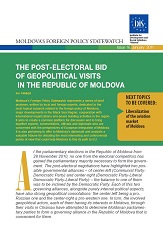
Keywords: Moldova 2010 elections;
At the parliamentary elections in the Republic of Moldova from 28 November 2010, no one from the electoral competitors has gained the parliamentary majority necessary to form the government. The post-electoral negotiations have highlighted two possible governmental alliances – of center-left (Communist Party-Democratic Party) and center-right (Democratic Party-Liberal Democratic Party-Liberal Party) – the balance to one of them was to be inclined by the Democratic Party. Each of these two governing alliances, alongside purely internal political aspects, have also strong geopolitical connotations: the center-left being a pro-Russian one and the center-right a pro-western one. In turn, the involved geopolitical actors, each of them having its interests in Moldova, through their visits in Chisinau have attempted to determine Moldovan parliamentary parties to form a governing alliance in the Republic of Moldova that is convenient for them.
More...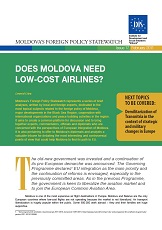
The old-new government was invested, and a continuation of its pro-European demarche was announced. The Governing Program declares EU integration as the main priority and the continuation of reforms is envisaged, especially in the previously committed areas. As in the previous Program, the government is keen to liberalize the aviation market and to join the European Common Aviation Area.
More...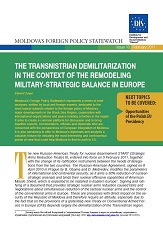
Keywords: START-treaty; START III; nuclear disarmament;
The new Russian-American Treaty for nuclear disarmament START (Strategic Arms Reduction Treaty) III, entered into force on 5 February 2011, together with the change of its ratification instruments between the heads of delega¬tions from the two countries. The Russian-American Agreement, signed on 8 April 2010 in Prague by B. Obama and D. Medvedev, modifies the parameters of international and continental security, as it aims a 30% reduction of nuclear-strategic arsenals and binds their nuclear offensive capabilities of American Missile Shield, which is expected to be installed in Eastern Europe. Signing and ratifying of a document that provides strategic nuclear arms reduction caused talks and negotiations about simultaneous reduction of the tactical nuclear arms and the control of the conventional arms in Europe. These are processes with direct impact on the security of the Republic of Moldova and therefore require an attitude, especially due to the fact that on the provisions of a (potential) new Treaty on Conventional Armed Forces in Europe (CFE) depends largely the demilitarization of the Transnistrian region.
More...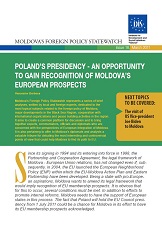
Keywords: Moldova EU Accession;
Since its signing in 1994 and its entering into force in 1998, the Partnership and Cooperation Agreement, the legal framework of Moldova - European Union relations, has not changed even if, sub-sequently, in 2004, the EU launched the European Neighborhood Policy (ENP) within which the EU-Moldova Action Plan and Eastern Partnership have been developed. Being a state with pro-Europe¬an aspirations, Moldova wants to amend its legal framework that would imply recognition of EU membership prospects. It is obvious that for this to occur, several conditions must be met. In addition to efforts to promote internal reforms, Moldova needs to have the support of European states in this process. The fact that Poland will hold the EU Council presi¬dency from 1 July 2011 could be a chance for Moldova in its effort to have its EU membership prospects acknowledged.
More...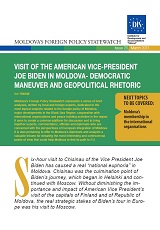
Six-hour visit to Chisinau of the Vice President Joe Biden has caused a real “national euphoria” in Moldova. Chisinau was the culmination point of Biden’s journey, which began in Helsinki and continued with Moscow. Without diminishing the im¬portance and impact of American Vice President’s visit of the capitals of Finland and of Republic of Moldova, the real strategic stakes of Biden’s tour in Europe was his visit to Moscow.
More...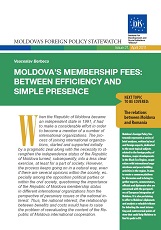
Keywords: Moldova international position;
When the Republic of Moldova became an independent state in 1991, it had to make a considerable effort in order to become a member of a number of international organizations. The process of joining international organizations, started and supported initially by a pragmatic zeal along with the necessity to strengthen the independence status of the Republic of Moldova turned, subsequently, into a less clear exercise, at least for a part of society. However, the process keeps going on in a natural way, even if there are several opinions within the society, especially among the opposition political parties or within the civil society, questioning the importance of the Republic of Moldova membership status in different international organizations from the perspective of pecuniary issues or the national interest. Thus, the national interest, the relationship between benefits and costs would have to raise the problem of reevaluating the content of the Re¬public of Moldova international cooperation.
More...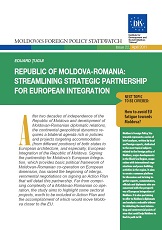
After two decades of independence of the Republic of Moldova and development of Moldovan-Romanian diplomatic relations, the continental geopolitical dynamics requires a bilateral agenda rich in policies and projects targeting accommodation (from different positions) of both states to European architecture, and especially, European Integration of the Republic of Moldova. Signing the partnership for Moldova’s European Integration, which provides basic political framework of Moldovan-Romanian co-operation on European dimension, has raised the beginning of inter-governmental negotiations on signing an Action Plan that will detail this partnership. Far from comprising complexity of a Moldovan-Romanian co-operation, the study aims to highlight some sectoral projects, worth to be included in Action Plan and the accomplishment of which would move Moldo¬va closer to the EU.
More...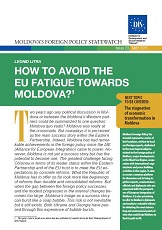
Keywords: Moldova EU-Accession;
Two years ago, any political discussion in Moldova or between the Moldova’s Western partners could be summarized to one question: Moldova quo vadis? Moldova was really at the crossroads. But nowadays it is perceived as the main success story within the Eastern Partnership. Indeed, Moldova has had remarkable achievements in the foreign policy since the AIE (Alliance for European Integration) came to power. However, Moldova is not yet a success story but has the potential to become one. The greatest challenge facing Chisinau in terms of its leader status within the Eastern Partnership and of the EU trust is to meet the EU expectations by concrete reforms. What the Republic of Moldova has to offer so far look more like beginnings of reforms than durable and consolidated reforms. But when the gap between the foreign policy successes and the modest progresses in the internal changes becomes too large, Moldova’s image as a success story can burst like a soap bubble. This risk is not inevitable, but it still exists. Both Ukraine and Georgia have passed through this experience of bubble bursts.
More...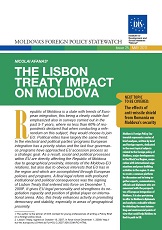
Republic of Moldova is a state with trends of European integration, this being a clearly visible fact emphasized also in surveys carried out in the past 5-7 years, where no less than 60% of respondents declared that when conducting a referendum on this subject, they would choose to join EU. Political elites have largely the same trend. In the electoral and political parties’ programs European integration has a priority status and the last four governance programs have approached EU accession process as a strategic goal. As a result, social and political processes within EU are directly affecting the Republic of Moldova due to geographical proximity, intensity of the Moldova-EU relations, but also due to obvious interests that EU has in the region and which are accomplished through European policies and programs. A final legal reform with profound institutional and political consequences was the signing of Lisbon Treaty that entered into force on December 1, 2009. It gives EU legal personality and strengthens its negotiation capacity and position of global player on international arena. Also, this treaty enhances activity in promoting democracy and stability, especially in areas of geographical proximity.
More...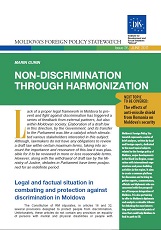
Keywords: anti-discrimination law;
Lack of a proper legal framework in Moldova to prevent and fight against discrimination has triggered a series of feedback from external partners, but also within Moldovan society. Elaboration of a draft law in this direction, by the Government, and its transfer to the Parliament was like a catalyst which stimulated various stakeholders interested in this subject. Although, lawmakers do not have any obligations to review a draft law within certain maximum terms, taking into account the importance and resonance of this law it was plausible for it to be reviewed in more or less reasonable terms. However, along with the withdrawal of draft law by the Ministry of Justice, debates in Parliament have been postpo¬ned for an indefinite period.
More...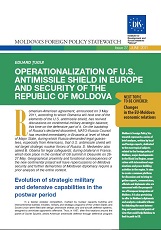
Keywords: anti-missile shield; NATO and Russia;
Romanian-American agreement, announced on 3 May 2011, according to which Romania will host one of the elements of the U.S. antimissile shield, has revived discussions on continental military-strategic balance, this time on the defensive part of it. On the backdrop of Russia’s declared discontent, NATO-Russia Council has reunited immediately in Brussels al level of Head of Major State, during which Russia demanded legal guaran¬tees, especially from Americans, that U.S. antimissile shield will not target strategic nuclear forces of Russia. D. Medvedev also asked B. Obama for legal safeguards; during bilateral in France, which took place in the context of G8 summit in Deauville on 26-27 May. Geographical proximity and functional consequences of the new continental project will have repercussions on Moldova security and further demarches of Moldovan diplomacy require a prior analysis of the entire context.
More...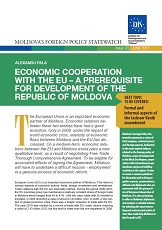
The European Union is an important economic partner of Moldova. Economic relations between these two entities have had a good evolution. Only in 2009, under the impact of world economic crisis, intensity of economic flows between Moldova and the EU has decreased. On a medium-term, economic relations between the EU and Moldova would pass a new qualitative level, as a result of negotiating Free Trade Thorough Comprehensive Agreement. To be eligible for associated effects of signing the Agreement, Moldova will have to undertake a difficult mission - employment in a genuine process of economic reform.
More...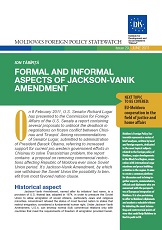
Keywords: Jackson-Vanik; Transnistria;
On 8 February 2011, U.S. Senator Richard Lugar has presented to the Commission for Foreign Affairs of the U.S. Senate a report containing several proposals to unblock the deadlock in negotiations on frozen conflict between Chisinau and Tiraspol. Among recommendations of Senator Lugar, submitted to administration of President Barack Obama, referring to increased support for current pro-western government efforts in Chisinau to solve Transnistrian problem, the report contains a proposal on removing commercial restrictions affecting Republic of Moldova ever since Soviet Union period. It’s Jackson-Vanik Amendment, by which one withdrawn the Soviet Union the possibility to benefit from most favored nation clause.
More...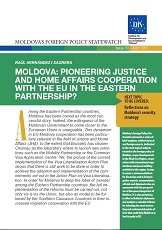
Keywords: Eastern Partnership;
Among the Eastern Partnership countries, Moldova has been coined as the most successful story. Indeed, the willingness of the Moldovan Government to come closer to the European Union is unarguable. This dynamism in EU-Moldova cooperation has been particularly relevant in the field of Justice and Home Affairs (JHA), to the extent that Brussels has chosen Chisinau as the laboratory where to launch new initiatives such as the Mobility Partnership or the Common Visa Application Centre. Yet, the picture of the current implementation of the Visa Liberalization Action Plan shows that there is still work to be done in order to achieve the adoption and implementation of the commitments set out in the Action Plan on Visa Liberalization. In order for Moldova to keep the label of ‘pioneer’ among the Eastern Partnership countries, the full implementation of the reforms must be carried out, not only vis-à-vis the Union, but also as model to be followed by the Southern Caucasus Countries in their increased migration cooperation with the EU.
More...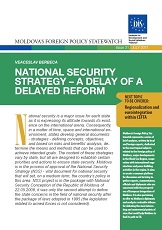
National security is a major issue for each state as it is expressing its attitude towards its existence on the international arena. Consequently, in a matter of time, space and international environment, states develop general documents - strategies - defining concepts, objectives, and based on risks and benefits’ analysis, determine the means and methods that can be used to achieve intended goals. The content of these strategies varies by state, but all are designed to establish certain priorities and actions to ensure state security. Moldova is in the process of approval of the National Security Strategy (NSS) - vital document for national security that will set, on a medium term, the country’s policy in this area. NSS project is in the package with National Security Conception of the Republic of Moldova of 22.05.2008, it was only the second attempt to define the state concerns in the field of national security after the package of laws adopted in 1995 (the legislation related to armed forces is not considered).
More...